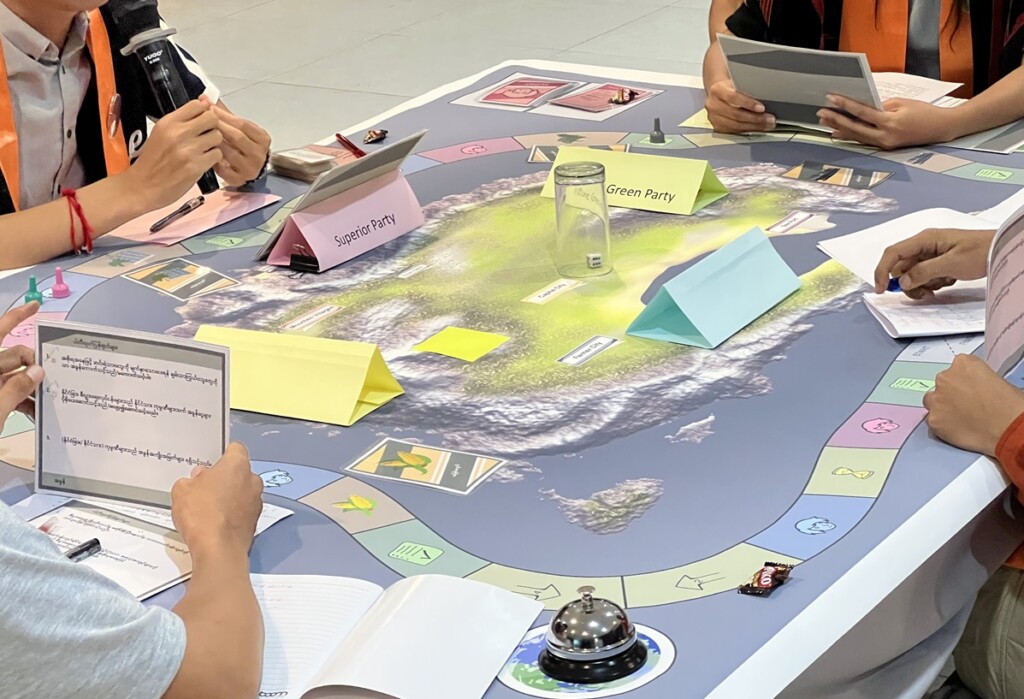
Demo Finland in Myanmar
Co-operation started in 2014.
Partner: Netherlands Institute for Multiparty Democracy (NIMD)
NIMD and Demo Finland’s programme aims to strengthen the political understanding and skills of women, young people and ethnic leaders as agents of change, so that they can contribute to a functioning democratic society. The programme provides democracy training with content focusing on political theory, dialogue, gender equality and best practices in politics. Democracy education is also offered through the MyDemocracy School application. The application provides access to users anywhere, anytime, allowing them to easily gain knowledge and skills on how to participate in democratic processes. The programme also supports democratic actors’ skills and dialogue processes at the local and regional levels.
Demo Finland and NIMD implemented democracy education programmes and supported multi-party co-operation and capacity building in Myanmar from 2014 to 2021. Following the military coup in February 2021, the activities were halted and new ways to support democratic actors in Myanmar were sought. In 2022, trainings were again launched online or outside the country. Myanmar has been in crisis since the military coup, and maintaining democratic values and skills at the local and regional levels is more important than ever for the country to have a more democratic future.
Results of our work
- The Myanmar programme in 2014–2021 was the first intensive multi-party training programme in the country at the State/Region level.
- Over 1200 politicians and civil society actors have been trained in the programme.
- More than 70% of the political parties participating in the programme have taken steps to promote gender equality within parties.
- Participants of the programme’s trainings have found new motivation to continue finding political solutions and dialogue to identify and address issues in their State/Region.
- The MyDemocracy School application has 1200 users, and its discussion forum is actively used. It has proven to be a learning tool with a wider reach, as its users share the knowledge they have acquired in their networks.
- The trainings have shown a significant cascading effect: Many of the women trained have taken the lessons forward within their own networks and as part of the self-governance structures that are taking shape at State/Region level. For example, one of the trained women has set up a three-month training course for young people in her state on good governance, the rule of law, politics, leadership and transitional justice.
- As a result of the work of the programme, in one state the articles of the women’s rights convention were more closely linked to the draft state constitution.
Background on Myanmar
Myanmar is a multi-ethnic country that had taken steps towards civilian rule since 2011, when the military junta that had ruled for some fifty years was gradually overthrown. In November 2015, the country held its first relatively free general elections. The 2020 elections were also largely free and fair, according to domestic and international election observers. However, the constitution still guaranteed a quarter of parliamentary seats to the military, making many of the reforms related to multi-party democracy difficult to implement. The army seized power in February 2021, and since then the country has been in the grip of a widespread civil war.
- Ranked 177/179 in V-Dem’s Liberal Democracy Index.
- Classified as a closed autocracy* by V-Dem.
- Latest parliamentary election: 2020.
- Women in parliament: The Parliament is suspended.
- The UN Covenant on Civil and Political Rights: Myanmar has not signed or ratified.
- The UN Convention on the Rights of Women was ratified in 1997.
- The UN Convention on the Rights of Persons with Disabilities was ratified in 2011.
- More information on the state of democracy in Myanmar: https://www.idea.int/democracytracker/country/myanmar
*No multi-party elections for the executive; absence of fundamental democratic components such as freedom of expression, freedom of association, and free and fair elections.
